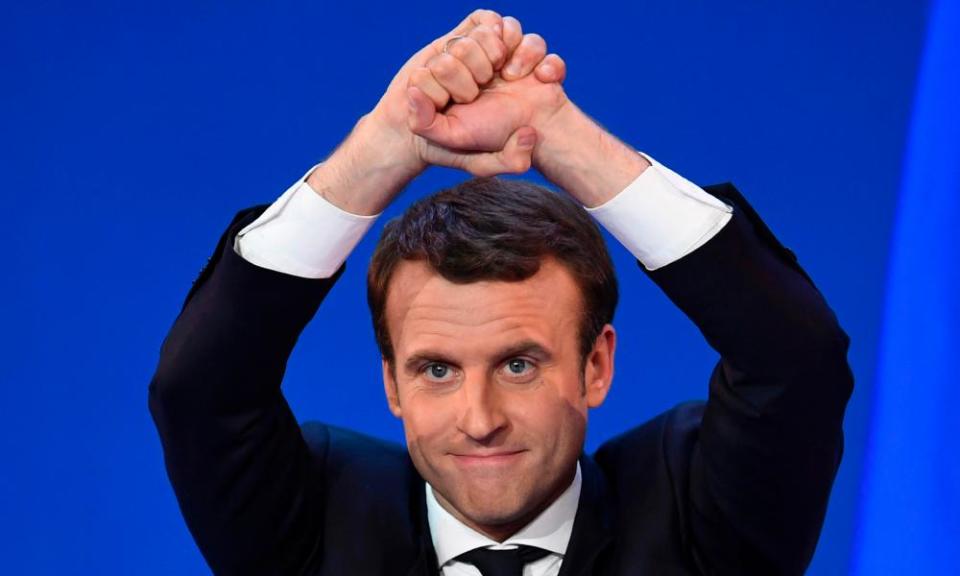Trump congratulates Emmanuel Macron on French election win
US president released statement notable primarily for its brevity, attempting to put behind him the implicit support he offered far-right leader Marine Le Pen

Donald Trump has congratulated the centrist Emmanuel Macron on his emphatic victory against Marine Le Pen in the French presidential run-off, attempting to put behind him the implicit support he had offered the far-right leader ahead of Sunday’s election.
In a statement put out by his press secretary Sean Spicer and notable primarily for its brevity, the White House said: “We congratulate President-elect Macron and the people of France on their successful presidential election. We look forward to working with the new President and continuing our close cooperation with the French government.”
Trump also tweeted a brief message of congratulations to Macron.
Congratulations to Emmanuel Macron on his big win today as the next President of France. I look very much forward to working with him!
— Donald J. Trump (@realDonaldTrump) May 7, 2017
Macron’s decisive trouncing of Le Pen by a ratio of almost two voters to one puts Trump in a slightly awkward position given his earlier qualified support for the loser in Sunday’s contest.
Last month the US president posted a tweet in which he said the recent terrorist attack in Paris that left a police officer dead in the Champs-Élysée would have a “big effect” on the upcoming presidential election.
In a later interview with Associated Press, Trump explicitly stated that he thought the Paris attack would “probably help” Le Pen. He never quite went as far as to endorse the former president of the Front National, but he did say she was “strongest on borders, and she’s the strongest on what’s been going on in France”.
The defeat of Le Pen pricks the bubble of populism that had swept the UK with Brexit and the US with the rise of Trump, and as such may have adverse knock-on effects for the new incumbent of the White House. Trump and Le Pen see eye-to-eye on issues ranging from immigration, suspicion of trade and globalism and an advocacy of what they both bill as nation-first politics.
On Le Pen’s side, she indicated before the US election last year that she would have voted for Trump had she been able. In January, just a week before Trump’s inauguration as president, she visited Trump Tower in Manhattan but did not meet him.
More recently, ties between the two may have paled. When Trump launched 59 cruise missiles at a Syrian air base last month in retaliation to a chemical weapons attack by the regime of President Bashar al-Assad, Le Pen was one of the few political leaders in Europe to criticize him.
“Trump had said repeatedly that he didn’t intend the United States to be the world’s policeman any longer, and that is exactly what he did,” she said.
Hillary Clinton, Trump’s rival in the presidential election, also offered her congratulations to Macron, saying in a tweet that the result was a victory “for France, the EU & the world”.
She also alluded to allegations that Moscow had attempted to sway the election in favour of Le Pen, saying the result was a “defeat to those interfering w/democracy. (But the media says I can’t talk about that)”.
Documents from the Macron campaign were leaked online on Friday after it became the target of a “massive and coordinated” hacking attack. Macron’s teak had previously blamed Russian interests for repeated attempts to hack its systems.
Clinton recently said Russian interference was partially to blame for her own election defeat, and Moscow’s role in the US election is now the subject of both an FBI investigation and two parallel investigations by the Senate and House intelligence committees.

